News of Terrorism and the Israeli-Palestinian Conflict
(October 6-12, 2009)
Gaza Strip
This past week, despite the events on the Temple Mount in Jerusalem, there was a decrease in the amount of rocket and mortar shell fire. One mortar shell hit was identified in an open field near the southern Israeli city of Sderot (October 7, 2009). There were no casualties and no damage was done. Elements within the Army of the Nation (a network affiliated with the global jihad) claimed responsibility for the attack, calling it retaliation for the events at Al-Aqsa mosque (Ma’an News Agency, October 8, 2009).
On October 6 civilians working near the Karni crossing were attacked with light arms fire. An IDF force responded with mortar shells. The military-terrorist wing of the Popular Front for the Liberation of Palestine claimed responsibility for the attack. According to reports in the Palestinian media, the Israeli fire wounded a number of Palestinian civilians (Qudsnews and Safa News Agency, October 6, 2009).
The crossings between Israel and the Gaza Strip were open all week and 642 trucks entered with food and supplies.
The statistics do not include the mortar shells fired at IDF soldiers patrolling the border fence which fell inside the Gaza Strip.
Hamas continues its policy of restraint
According to an article in the London-based Arabic newspaper Al-Sharq Al-Awsat, as the events at the Al-Aqsa mosque in Jerusalem caused tension, the de-facto Hamas administration tightened its control of the Gaza Strip and prevented rockets from being fired into Israeli territory. The paper also reported that on two separate occasions Hamas’ security forces detained operatives of new networks who were planning to fire rockets. The operatives were interrogated and released after their rockets had been confiscated and they had been warned not to fire again. According to the article, Hamas security forces take the same measures against operatives from larger organizations such as the Palestinian Islamic Jihad (Al-Sharq Al-Awsat, October 6, 2009).
Another source reported that Hamas’ attempt to detain a Palestinian Islamic Jihad operative led to exchanges of fire between PIJ and Hamas operatives in the Shati refugee camp (PalPress website, October 9, 2009). A senior PIJ figure claimed that on at least three instances during the past month Hamas security forces prevented the PIJ from firing rockets into Israel in retaliation for killing two of its operatives and for the events on the Temple Mount. He added that Hamas has detained two other PIJ operatives over struggles for control of a mosque in the northern Gaza Strip. Ihab al-Ghussin, spokesman for the ministry of the interior of the Hamas de-facto administration, said in response that “Hamas does not restrict the resistance’s activity” (Al-Ayyam, October 11, 2009).
Judea and Samaria
The Israeli security forces continued their counterterrorism activities this past week, detaining Palestinians suspected of terrorist activities. There were many attacks this week, among them the following:
October 12: Stones were thrown at an Israeli vehicle southeast of Hebron. There were no casualties but the vehicle was damaged (IDF Spokesman, October 12, 2009).
October 11: Stones were thrown at an Israeli vehicle southwest of Bethlehem. There were no casualties but the vehicle was damaged. Stones were also thrown at an Israel vehicle southeast of Qalqilya and north of Ramallah. There were no casualties but the vehicle was damaged (IDF Spokesman, October 11, 2009).
October 11: A knife and improvised IED were found in the possession of two Palestinian youths at the Hawara checkpoint south of Nablus (IDF Spokesman, October 11, 2009).
October 11: A fake IED was thrown at an IDF force at the Hawara checkpoint. There were no casualties and no damage was done. The IED was detonated in a controlled explosion by the IDF force (IDF Spokesman, October 11, 2009).
October 10: An Israeli woman civilian was injured when stones were thrown at her car south of Nablus. Stones were also thrown at an Israel vehicle southeast of Bethlehem. There were no casualties(Ynet, October 10, 2009).
October 10: An IDF force uncovered a stockpile of Molotov cocktails ready for throwing in a village north of Nablus (Ynet, October 10, 2009).
October 9: Stones were thrown at an Israeli vehicle northeast of Ramallah. A female Israeli passenger sustained a head injury (Ynet, October 10, 2009).
October 8: Stones were thrown at an Israeli bus near Bethlehem. There were no casualties but the bus was damaged (IDF Spokesman, October 8, 2009).
Hamas prepares to respond to the Goldstone Report
On October 8 Al-Quds Al-Arabi reported that the Hamas leadership in the Gaza Strip was preparing legal responses to the accusations made against it by the Goldstone Report. A committee had been appointed to repudiate the accusations, especially those concerning its use of civilians as human shields during Operation Cast Lead. According to Mahmoud al-Zahar, the committee would submit evidence based on events on the ground and on reports by international organizations such as Human Rights Watch (Al-Quds Al-Arabi, October 8, 2009).
Internal power struggles in the Dughmush clan
On the afternoon of October 10 there was a confrontation in the Sabra network in the southern part of Gaza City between terrorist operatives of the so-called Popular Resistance, members of Zakaria Dughmush’s family and members of Mumtaz Dughmush’s family belonging to the Army of Islam. The confrontation lasted for two hours. The house of the organization’s secretary general, Zakaria Dughmush, was attacked with machine guns and RPGs and Rashid Dughmush was killed (PalToday website, October 10, 2009). Elements within the so-called Popular Resistance asked the Hamas de-facto administration to investigate the affair and find the guilty parties. They said it was a question of an internal clan conflict (Muqawamah website, October 10, 2009). This is not the first time the influential Dughmush clan has been involved in internal power struggles linked to the terrorist organizations.
The peace process
Following American envoy George Mitchell’s meeting with Palestinian Prime Minister Salam Fayyad and Israeli Prime Minister Benjamin Netanyahu, the Palestinian Authority said in a statement that Mitchell’s visit had not lead to “genuine progress in relaunching the peace process and ensuring its success because of the position of the Israeli government” (Wafa News Agency, October 12, 2009).
Israeli Prime Minister Benjamin Netanyahu opened the winter session of the Knesset [Israeli Parliament] with a speech relating, among other things, to the principles of Israel-Palestinian peace. He said those principles were Palestinian recognition of Israel as a Jewish state, a solution to the refugee problem beyond the borders of the State of Israel, an effective and recognized demilitarization of the Palestinian state and to put an end to Palestinian demands on Israel [as part of any agreement reached]. He also reviewed the steps taken by Israel to improve Palestinian welfare, which included the dismantling of roadblocks and checkpoints, removing the earthworks blocking roads, improving freedom of movement, encouraging commerce and leaving the Allenby Bridge open for longer hours.
Following internal pressure caused by Hamas’ vicious propaganda campaign, the Palestinian Authority is bringing the Goldstone Report before the UN Human Rights Council in Geneva and the General Assembly in New York. In addition, on October 11 the PLO’s Executive committee again adopted the report. Palestinian media reported that Mahmoud Abbas had received a phone call from UN Secretary General Ban Ki-moon. Ban reportedly expressed support for Mahmoud Abbas’ request to hold an extraordinary session of the Council in Geneva to ratify the Goldstone Report, as well as support for the report in the deliberations which will be held in the Security Council between October 10 and 14 (Wafa News Agency, October 11, 2009).
Saeb Erekat, head PLO negotiator, said that Mahmoud Abbas had asked that the Goldstone Report be presented to the Human Rights Council. He added that the Palestinian Authority chairman had instructed the Palestinian representative in Geneva to call on the Arab-Muslim world and the unaligned countries to meet to present the report again (Al-Jazeera TV, October 9, 2009). In addition, Libya and the Palestinians are planning to introduce the Goldstone Report into the General Assembly’s monthly discussion of the Middle East. Palestinian Foreign Minister Riyad al-Maliki said that the Palestinians were trying to convince UN members support the Goldstone Report.
Violent incidents on the Temple Mount abate.
The Friday, October 9, prayers on the Temple Mount in Jerusalem and Judea and Samaria ended with relative quiet despite the incitement campaign to violence in Jerusalem. In the Gaza Strip Hamas and the Palestinian Islamic Jihad organized mass demonstrations. In Judea and Samaria there was a general protest strike, and marches and rallies in the cities. Hamas issued a press release accusing the Palestinian Authority security forces of preventing marches to support Al-Aqsa mosque.
Hamas and Fatah activists said the following about maintaining and even escalating the tension in Jerusalem:
Ismail Haniya, head of the Hamas de-facto administration in the Gaza Strip, gave a speech after the Friday prayers in which he denounced Israel’s actions in Jerusalem, describing them as “implementing the Zionist plan to completely take over Al-Aqsa mosque.” He said Israel’s actions were “especially serious” and that the Palestinians would not give up Jerusalem and would pay any price to maintain the sanctity of Al-Aqsa mosque (Hamas’ Palestine-Info website, October 9, 2009).
Imad Afana, political writer and secretary general of the Hamas faction in the Palestinian Legislative Council, wrote an article calling on Hamas to carry out terrorist attacks against Israel immediately, with the emphasis on Jerusalem. He said the attacks should be of all types, carried out by individuals and groups, with knives and rocks, tractors and explosives, shooting and sniping (Hamas’ Palestine-Info website, October 9, 2009).
Hatem Abd al-Qader, who holds the Fatah Jerusalem affairs portfolio and who often comments on the subject, told a Hezbollah website that the end of the current crisis at Al-Aqsa mosque did not in any way mean that the “danger” threatening Jerusalem had ended. He called on Palestinians to go to the ribat of the Al-Aqsa mosque precinct, to crowd into the mosque during prayers and to make sure there were people there 24 hours a day (alintiqad.com, October 11, 2009). Ribat: an Islamic term for a defensive deployment on the front line with the enemy to defend Muslims from infidels in preparation for jihad.
Verbal infighting between Hamas and Mahmoud Abbas continues
While the Palestinian media deals extensively with the changes of a reconciliation agreement’s being signed, verbal infighting has escalated between Mahmoud Abbas and Hamas, focusing on mutual accusations hurled by Mahmoud Abbas and Khaled Mashaal. Both gave televised speeches relating to the events in Jerusalem, the Goldstone Report and Fatah-Hamas relations. The main points of the speeches were the following:
Mahmoud Abbas: On October 11 Mahmoud Abbas spoke on Palestinian Television. Mahmoud Abbas strongly attacked Israel for its actions in Jerusalem, which he called “ethnic cleansing.” He claimed that Al-Aqsa mosque had become a permanent target of Israel and “radical Israelis” in their efforts to Judaize Jerusalem. He also said that Jerusalem was “the door and key to peace” and that continuing to harm it “fanned the flames of tension and war in the Middle East and the world.” He claimed that the Palestinian residents of Jerusalem were stopping “the new attack on Al-Aqsa TV and Jerusalem,” and that the Palestinians were determined to defend Jerusalem, “the capital of Palestine.” He also said that no peace agreement would be signed if it did not include the end of the so-called “Israeli occupation” of Jerusalem. The Palestinians, he said, were integrated into the efforts of the Obama administration to advance the peace process. However, they were not influenced by pressure and had not changed their position during the tripartite meeting in New York. [Meeting with Salam Fayyad on October 10,] American envoy George Mitchell made it clear that the condition for to assure “the end of the occupation and the building in the settlements, and the establishment of a Palestinian state with the 1967 borders.” Mahmoud Abbas said that the Palestinian Authority was working in the UN Human Rights Council in Geneva to raise the proposal. However, it had not yet been lodged because there were countries which did not agree to it and the Palestinians wanted to avoid a situation in which they could not achieve the necessary majority in the Council. According to Wafa News Agency, October 11, 2009, he added [apologetically] that he understood the anger caused by the issue and hinted that he was ready to take responsibility (“I have always believed that a senior [leader] is elected when the people trust him, and he has to take responsibility for his people…”). He said he had told the Palestinian Authority representative in Geneva [Ibrahim Kharisha] to call an extraordinary session of the Human Rights Council to discuss and vote on the Goldstone Report. He added that the had asked the permanent Palestinian Authority observer in the UN (Riyad Mansour] to initiate the same action in the Security Council and the General Assembly. The Palestinian Authority, he said, was making every possible effort to end the schism caused by Hamas takeover of the Gaza Strip. The solution of the crisis was “to ask the people for a verdict and to return to the polls.” He said that the Palestinian Authority did not need Hamas to vouch for its honesty. He said Hamas’ campaign against him had exposed its [true] goal, which was to evade signing the national reconciliation agreement so that it could perpetuate its “emirate” in the Gaza Strip and topple the Palestinian Authority.
In response Hamas said the following: Mahmoud al-Zahar, member of the Hamas political bureau in the Gaza Strip, said that Mahmoud Abbas was the main reason discussion of the Goldstone Report had been postponed, despite his efforts to blame others (Al-Quds TV, October 11, 2009). Ahmed Bahar, deputy speaker of the Palestinian Legislative Council, said that Mahmoud Abbas’ speech “disappointed the hopes” of the Palestinians and it was a continuation of the denial of the rights of the victims of Operation Cast Lead and a cover-up of Israel’s actions (PalToday website, October 12, 2009). Sami Abu Zuhri, Hamas spokesman, described the speech as “an evasion of responsibility for postponing the discussion of the Goldstone Report.”
Khaled Mashaal spoke in Damascus, and said the following (Al-Aqsa TV, October 11, 2009):
The Obama administration: Khaled Mashaal said that at the beginning of its term the Obama administration used “a different language” and showed positive signs, but had not translated words into deeds. Obama, he said, had received the Noble Prize for flowery rhetoric and for promises which had not been kept: “The Obama administration gives words to us and deeds to our enemies,” and thus the Palestinians had no support in the their struggle against Israel. Adherence to the path of the “resistance” [violence and terrorism] and the other “rights of the Palestinians:” Khaled Mashaal repeatedly stated that “the resistance is the strategic option to liberate out land and restore our rights.” He stated his adherence to “the right of return,” to Jerusalem and to the “liberation” of Palestinian land from the “foreigners” who occupied it. The Palestinian Authority and the PLO: According to Khaled Mashaal, both were leading the Palestinians to destruction and oppressing the residents of the West Bank. He accused the PA of not opposing Operation Cast Lead, of casting doubt on “the right of return” and of being ready to trade territory. He attacked the PA for accepting President Obama’s invitation to the tripartite meeting in New York. The Goldstone Report: Khaled Mashaal accused the Palestinian Authority of rushing to renege on its support for the report: “When an international report condemns Israel the PA tries to rescue it.” He added that the PA had gotten entangled in excuses for reneging on its support of the report and continued to lie. He said the PA leadership should be held accountable, especially Mahmoud Abbas, and that a “wise” Palestinian leadership should be appointed in its stead, one that understood the interests of the Palestinian people. He claimed that the Palestinian presidency was not legal and had not been since January 2009 according to Palestinian law. He said that [the issue of] the Goldstone Report had caused great anger and that it would therefore be impossible to hold the reconciliation meeting [scheduled for Cairo on October 24].
Khaled Mashaal ignored the fact that the report strongly denounced Hamas’ indiscriminate rocket fire into Israel and called it “…a war crime, and may amount to crime against humanity” (Goldstone Report p. 474).
Fatah’s Central Committee said that Khaled Mashaal’s speech indicated “escalation which did not take into consideration the interests of the Palestinians and was a serious attack on the attempts being made to reach a reconciliation and an agreement” (Ma’an News Agency, October 12, 2009). Hussein al-Sheikh, a member of the Committee, said that Khaled Mashaal’s speech was an expression of the decision made by Hamas to destroy the Egyptian efforts for reconciliation (Agence France-Presse, October 11, 2009).
Reconciliation dialogue between Fatah and Hamas
Palestinian and foreign media have reported that the Hamas leadership in the Gaza Strip told the Egyptians that the movement did not intend to participate in the final round of the reconciliation dialogue planned for October 24 and that it refused to sign a reconciliation agreement with Fatah on October 26. The reason [or excuse] for its refusal was the Palestinian Authority’s agreement to postpone the discussion of the Goldstone Report (Reuters, October 8; QudsNet website, October 7, 2009). Khaled Mashaal also stated in his speech that it would be impossible to hold the reconciliation meeting. On the other hand, Ismail Radwan and Mahmoud al-Zahar denied the report about the meeting in Egypt and said that the Hamas leadership was still debating the question of whether or not to boycott the next round of talks (Al-Arabiya TV, October 8, 2009).
Hamas’ propaganda campaign against the Palestinian Authority continues
Hamas propaganda campaign against Mahmoud Abbas and the Palestinian Authority continued this past week as well, with an attempt to exploit the events in Jerusalem and the Goldstone Report to smear the PA: In the Gaza Strip signs were hung by a group of university lecturers working under Hamas aegis. The signs show Mahmoud Abbas in the foreground which an X across his face and in the background “shaheeds” from Operation Cast Lead. The caption reads “Mahmoud Abbas, traitor, [you will go] to the garbage can of history” (Lebanese newspaper Al-Akhbar website, October 8, 2009). The Hamas leadership refused to denounce the signs and Ismail Radwan justified them, saying that they were the outcome of public rage against Mahmoud Abbas following the postponement of the discussion of the Goldstone Report (Ma’an News Agency, October 7, 2009).
Ihab al-Ghussin, spokesman for the ministry of the interior of the Hamas de-facto administration, said in an interview on Al-Jazeera TV that Hamas intended to bring Mahmoud Abbas to court for his conduct in the Goldstone Report affair. He said that Fathi Hamad, minister of the interior of the Hamas de-facto administration, would appoint a legal committee headed by the advisor to the minister of justice to sue Mahmoud Abbas in the name of the shaheeds who had belonged to the ministry of the interior, in international courts and human rights institutions (Al-Jazeera TV, October 7, 2009).



 RSS
RSS

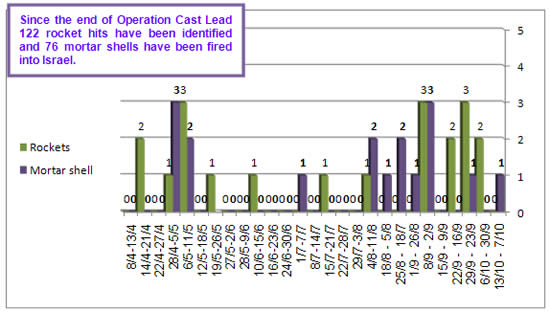
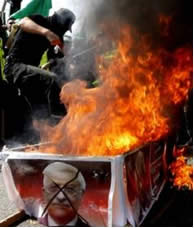

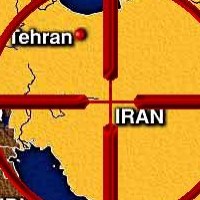
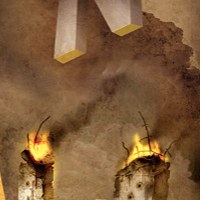
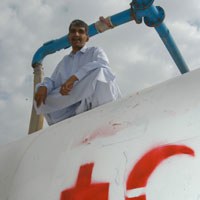
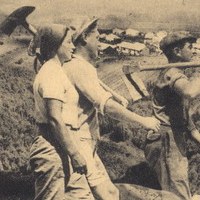
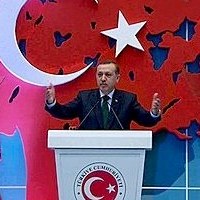




Latest Comments
Hello Mike, Thank you for your positive feedback to the article. I felt there wasn’t too much critical analysis of ...
Thanks for this considered and well constructed article. A follow up article on the manner in which the editorial contro...
THE CLUELESSNESS OF CLAIMING THAT OBAMA'S MIDDLE EAST POLICIES WERE A FAILURE CANNOT BE FURTHER FROM THE TRUTH, WHAT THE...
As long as Obama is the president of the usa do not trust the us government......
Thank you for an good read....